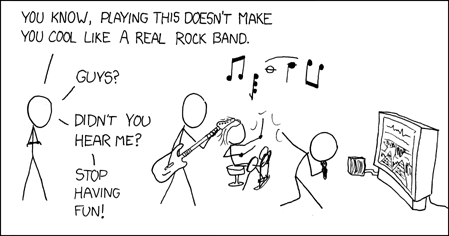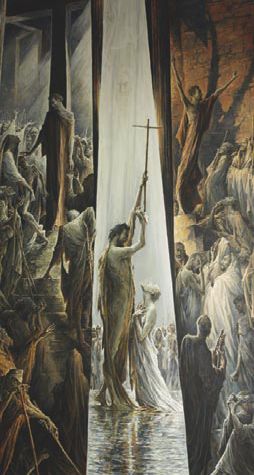Crossposted from Blogger of Jared--my first real post there.
One of the funny things about being a writer is that you have to be somewhat narcissistic. You have to think your words are important enough to share. To quote Orson Scott Card:
Let's face it. You don't start writing fiction if you didn't have a healthy dose of vanity and ambition. What could be more arrogant than to believe that stuff you make up out of your head will be so pleasurable to others that they ought to pay you to be able to read it?
Although the quote applies specifically to fiction, the point applies to writers of the personal essay, and even journal writing. If you’re not, say, Winston Churchill or Ghandi, why is your life important enough for me to spend any time on, not even taking money into consideration? I've talked to many people who've pushed off journal writing with just this attitude. I’ve even felt it myself--the guilt of writing something of no importance. It seems wasteful. As I’ve been working on personal essays for my honors thesis, I’ve rediscovered how plain my life is: no physical disabilities, no abusive family, no major obstacles, no major accomplishments, no strange events, no extraordinary revelations, no doubts. It's just life, all PB&J sandwiches and afternoon TV programs, bland and continuous. Perhaps the only thing unusual about my life is how ordinary it is. I suffer, as I’m sure many do, from a form of angst envy, wishing that my life was just slightly more interesting. But not too interesting, of course--I'm not asking for major trials, just something worth talking about.
Strangely, being Mormon solves this problem: our religion is one with a strong belief in the importance of every individual. We’re one of the few branches of Christianity who believes God isn’t some omniscient blob, but a person with a body and a personality. We believe that simply by your membership and your humanity, you are qualified to instruct others in sacrament meetings and gospel doctrine classes. In our temples, we do work for individual people, one at a time, slowly slowly. The insane scope of our temple work project has only recently hit me: do we realize it will take more than a million years of cumulative two-hour endowment sessions to cover the earth’s current population, not to even begin to think about those who are dead?
Most importantly, we believe fervently that each individual has direct access and right to revelation from God. To us, or at least, to me, God is not only someone who enacts our salvation, but someone who cares about our mundane lives, who inserts the little "tender mercies." That intense divine interest and compassion qualifies every life as important reading material. President Eyring’s talk in the Sunday morning conference session, "O Remember, Remember," makes this same point:
I came home late from a Church assignment. It was after dark. My father-in-law, who lived near us, surprised me as I walked toward the front door of my house. He was carrying a load of pipes over his shoulder, walking very fast and dressed in his work clothes. I knew that he had been building a system to pump water from a stream below us up to our property.
He smiled, spoke softly, and then rushed past me into the darkness to go on with his work. I took a few steps toward the house, thinking of what he was doing for us, and just as I got to the door, I heard in my mind—not in my own voice—these words: “I’m not giving you these experiences for yourself. Write them down.”
I went inside. I didn’t go to bed. Although I was tired, I took out some paper and began to write. And as I did, I understood the message I had heard in my mind. I was supposed to record for my children to read, someday in the future, how I had seen the hand of God blessing our family. Grandpa didn’t have to do what he was doing for us. He could have had someone else do it or not have done it at all. But he was serving us, his family, in the way covenant disciples of Jesus Christ always do. I knew that was true. And so I wrote it down, so that my children could have the memory someday when they would need it.
As President Erying says, “forgetting God has been such a persistent problem among His children since the world began.” Therefore one of the first commandments of God to his people has always been for them to keep a record of their interactions with him (Moses 6:5,46). These records not only record our lives, but transform them:
I wrote down a few lines every day for years. I never missed a day no matter how tired I was or how early I would have to start the next day. Before I would write, I would ponder this question: “Have I seen the hand of God reaching out to touch us or our children or our family today?” As I kept at it, something began to happen. As I would cast my mind over the day, I would see evidence of what God had done for one of us that I had not recognized in the busy moments of the day. As that happened, and it happened often, I realized that trying to remember had allowed God to show me what He had done.
I used to be bothered by this idea that reflection inserts revelation into our past. It seemed like creating something out of nothing. It was a stretch, like wresting the scriptures, wasn't it? But over the past year of developing my own writing I've seen ordinary parts of my own life--going to school, visiting a museum--transformed into some of my most meaningful memories because I wrote about them. This process of living and then realizing is simply part of being human. We don't have the mental capacity to realize the implications of what's happening at the moment we're in it. I think there's a reason that pondering is in the primary song along with searching the scriptures and praying. If we don't think, we miss much of what the Lord has to say to us. We must study out our lives in our minds to find the things of eternity.
But finding these revelations in your life is not the last step. That whispering voice told President Erying, “I’m not giving you these experiences for yourself. Write them down.” Where would the Church be if Nephi had ignored the command to make a second set of plates? As spirit children of God, our experiences count for something. Again, there's a reason this Church has no paid ministry and I believe it is because we each have something to teach and something to learn. How you saw God's hand in your life might help someone else, either by testifying of God's love or by helping them to see things in their own lives. It doesn't matter your background, your education, your doubts: write them down and share them as inspired by the Spirit.










